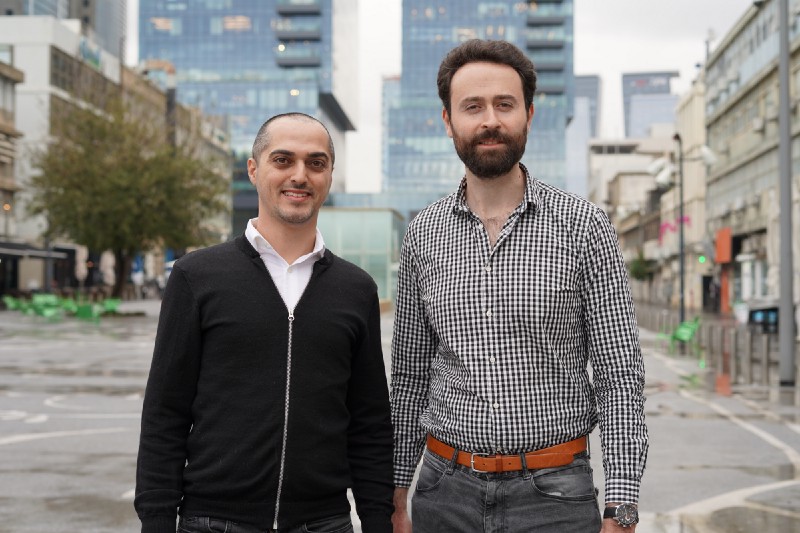Tastewise is using Big Data, artificial intelligence and the growth of delivery services to offer new insights into food trends that fundamentally shift the way decisions are made by the hospitality and restaurant industries. The company is working with corporate partners like Marriott and so-called virtual restaurants to bring greater predictability to customer demand.
“We’re currently working with some of the largest food and beverage brands out there to help them understand what is happening today and what it is going to look like tomorrow because it’s pretty difficult to see,” says Tastewise co-founder and CEO Alon Chen.
 Tastewise co-founders Alon Chen (left) and Eyal Gaon
Tastewise co-founders Alon Chen (left) and Eyal GaonChen previously worked as Google’s chief marketing officer for Israel and Greece and was the search engine’s global lead for engagement with the World Economic Forum. But several years ago,he began to notice how his own family’s eating habits were constantly changing and evolving, embracing new trends like the Keto diet. “Every week there was some new thing, a new diet,“ he says. “Paleo, pescatarian. So then I wondered if it’s changing so much in our lives, what’s happening out there in the wider world?”
The food and beverage constantly asks the same question. But Chen also saw that in many cases, the leading companies were relying on antiquated methods to probe the market and discover trends. “I started talking to the industry and I quickly realized that they were still spending tens of billions of dollars on surveys that involved someone walked around a shopping mall asking people what the next flavor of yogurt should be,” he says.
That led Chen, along with co-founder Eyal Gaon, to create Tastewise two years ago. The Tel Aviv-based company has built a platform that uses AI to crunch billions of data points it has acquired from sources ranging from hundreds of thousands of restaurant menus to social media. The company’s algorithms and computer vision then analyze photos and words and drill down into people’s sentiments about ingredients and what they suggest.
“We see that people are drinking a lot of Kombucha and it’s a fermented drink,” he says. “But it’s one thing to understand that Kombucha is taking over. And it’s another thing to understand that they’re drinking it because it has some anti-inflammatory properties.”
In the case of one its biggest clients, Marriot, Chen says that Tastewise is helping identify gaps in the market. At a time when restaurants are wanting to accelerate the pace at which they change menus Tastewise’s data is helping address questions such as whether a location should consider something like a cocktail bar or a pizzeria.
“By collaborating with Tastewise, we’ve been able to transform our strategy and decision making with real-time industry data and predictive analytics,” Guy Heksch, Global Vice President of Marriott International-owned Pure Grey Culinary Concepts Hospitality Group, said in statement when Tastewise launched in February. “Diving far deeper than simply understanding consumer preferences, their insights help us select target audiences, catch micro-trends as they sweep from neighborhood to state level and design menus to suit our guests’ tastes, even pinpointing exactly what it takes to concoct a sensational cocktail. Tastewise brings science to the art of creating innovative food experiences and propels us to act faster than ever before. Their technology is a complete game changer for us, and I suspect it will be for the hospitality industry as a whole.”
Tastewise is also targeting the rapidly growing number of virtual kitchens. These are basically restaurants that only make food to be delivered via a wide number of delivery services. With people shifting from buying groceries to buying prepared good, this evolution represents a big opportunity for Tastewise.
As with other more traditional clients, Tastewise can also help spot menu trends. But in this case, Tastewise can also get involved at the stage where companies are considering where to open kitchens and what kind.
“We’re able to tell you where there is a gap in the market,” he says. “So, if you want to tap into the Keto trend, we can tell you where there is a lot interest in the Keto diet and where those people make it at home but don’t have any Keto restaurant options. That’s a great opportunity for somebody.”
Last year, Tastewise raised $1.5 million and Chen says the company is working to close another round of funding to expand its staff of eight people. At the moment, he says the biggest challenge is finding the right people to help the company keep up with the strong demand it’s seeing from the food industry.
“We have a lot more demand than we anticipated,” he says. “All the retailers and consumer packaged goods companies and virtual restaurants want to find a way to spend better.”






